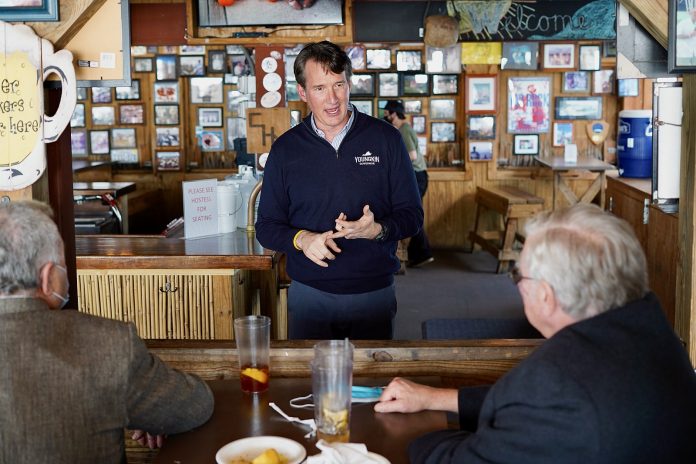Virginia Gov. Glenn Youngkin is backing out of the Regional Greenhouse Gas Initiative (RGGI) an interstate compact that imposes costly caps on carbon dioxide emissions.
(The Center Square) – Gov. Glenn Youngkin’s administration will use its regulatory authority to end Virginia’s participation in a costly carbon credit program.
The decision is likely to face a legal challenge by environmentalist groups who say the executive branch doesn’t have the legal authority to do so.
The Regional Greenhouse Gas Initiative, also known as RGGI, is a multistate compact that gradually reduces carbon emissions over several years in the participating states. RGGI caps the amount of carbon emissions allowed in the state and puts limits on individual entities. Those entities must purchase a limited number of carbon credits if they need to emit more carbon, but the number of available credits decreases over several years. Going over one’s allotted carbon emissions would yield hefty fines.
Virginia entered the compact under former Gov. Ralph Northam’s administration after the General Assembly passed legislation authorizing him to do so. Most of the credits are purchased by the commonwealth’s energy utilities and some of the costs are being passed down to ratepayers. Between 2019 and 2043, the State Corporations Commission estimates that RGGI will cost nearly $6 billion and eventually yield rate increases between $84 and $144 for the average ratepayer annually.
Youngkin campaigned on getting Virginia out of RGGI and his administration is acting on that promise. In a statement, Acting Secretary of Historic and Natural Resources Travis Voyle said the administration will repeal the trading rule, which would end the commonwealth’s participation in the compact.
“RGGI is a bad deal for Virginia and RGGI costs are being passed on to Virginian consumers,” Voyle said. “To ensure the Commonwealth is pursuing environmental protection, improvements to energy reliability and innovation, and providing affordable energy to consumers, there is a need to step away from the status quo and current path of energy policy that forces a transition without consideration to impacts. Given all of this and how RGGI is a bad deal for Virginians, the Administration will be moving forward with an action to repeal the trading rule and end Virginia’s participation in RGGI.”
The plan to leave RGGI and the process by which the governor intends to do so are both controversial. Environmental groups and Senate Democratic leadership have said they do not think the administration can take Virginia out of RGGI without going through the General Assembly, which could turn Virginia’s potential exit into a legal battle.
“RGGI has already proven it reduces pollution at the same time that it brings in desperately needed resources,” Nate Benforado, a senior attorney for the Southern Environmental Law Center, said in a statement.
“But instead of supporting this popular program to reduce carbon pollution, the Youngkin administration has consistently sought to take unlawful action to end Virginia’s participation in RGGI – despite the fact that neither the governor nor regulators have the authority to do so,” Benforado added. “The lawmakers who do have that authority in the General Assembly know RGGI is already delivering real resources to Virginians on the frontlines of climate change.”
Although the General Assembly authorized Virginia’s participation in RGGI, some opponents of the compact have argued that nothing in the law requires the commonwealth to participate and the administration can leave the compact if it wishes.
“I don’t read the statute as requiring that Virginia participate in the compact, or that it impose this tax utility on customers,” Stephen Haner, a senior fellow for state and local tax policy at the free-market Thomas Jefferson Institute, told The Center Square.
“If they wanted the bill to say that, they wrote it poorly,” Haner said. “But without doubt some Virginia judge will get that question. Unfortunately, the full regulatory process will take at least another year and a half, meaning Virginia energy costs will continue to include the RGGI tax for that period – probably another $500 million in six more auctions.”
In January, Youngkin directed the Department of Environmental Quality to notify RGGI of the governor’s intent to withdraw, either through his regulatory authority or through legislation.
Originally published by The Center Square. Republished with permission.
For more Environment & Climate News.



























unless your a flat earth science denier you know the earth has been warming up for 12.000 years, this would be difficult to type under 300 feet of ice… when asked why i do not believe in anthropogenic weather change i say “no one has answered my questions”…
:what does misogyny in africa have to do with manmade climate change since massive funds in the paris climate fiasco are allocated for that debacle?…
:what are they going to do about some of the the worst polluters – battery & solar panel manufacturing, volcanos & super volcanos etc?…
:they never mention the biggest climate modifier, water/moisture…
:if the science is final why have 100% of all predictions past their target date been delusional & wrong?…